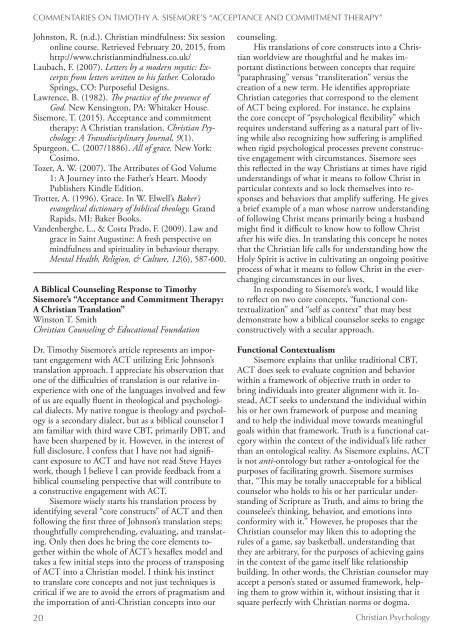CHRISTIAN PSYCHOLOGY
Christian-Psychology-8.2-2014-Acceptance-and-Commitment-Therapy
Christian-Psychology-8.2-2014-Acceptance-and-Commitment-Therapy
Create successful ePaper yourself
Turn your PDF publications into a flip-book with our unique Google optimized e-Paper software.
COMMENTARIES ON TIMOTHY A. SISEMORE’S “ACCEPTANCE AND COMMITMENT THERAPY”<br />
Johnston, R. (n.d.). Christian mindfulness: Six session<br />
online course. Retrieved February 20, 2015, from<br />
http://www.christianmindfulness.co.uk/<br />
Laubach, F. (2007). Letters by a modern mystic: Excerpts<br />
from letters written to his father. Colorado<br />
Springs, CO: Purposeful Designs.<br />
Lawrence, B. (1982). The practice of the presence of<br />
God. New Kensington, PA: Whitaker House.<br />
Sisemore, T. (2015). Acceptance and commitment<br />
therapy: A Christian translation. Christian Psychology:<br />
A Transdisciplinary Journal, 9(1).<br />
Spurgeon, C. (2007/1886). All of grace. New York:<br />
Cosimo.<br />
Tozer, A. W. (2007). The Attributes of God Volume<br />
1: A Journey into the Father’s Heart. Moody<br />
Publishers Kindle Edition.<br />
Trotter, A. (1996). Grace. In W. Elwell’s Baker’s<br />
evangelical dictionary of biblical theology. Grand<br />
Rapids, MI: Baker Books.<br />
Vandenberghe, L., & Costa Prado, F. (2009). Law and<br />
grace in Saint Augustine: A fresh perspective on<br />
mindfulness and spirituality in behaviour therapy.<br />
Mental Health, Religion, & Culture, 12(6), 587-600.<br />
A Biblical Counseling Response to Timothy<br />
Sisemore’s “Acceptance and Commitment Therapy:<br />
A Christian Translation”<br />
Winston T. Smith<br />
Christian Counseling & Educational Foundation<br />
Dr. Timothy Sisemore’s article represents an important<br />
engagement with ACT utilizing Eric Johnson’s<br />
translation approach. I appreciate his observation that<br />
one of the difficulties of translation is our relative inexperience<br />
with one of the languages involved and few<br />
of us are equally fluent in theological and psychological<br />
dialects. My native tongue is theology and psychology<br />
is a secondary dialect, but as a biblical counselor I<br />
am familiar with third wave CBT, primarily DBT, and<br />
have been sharpened by it. However, in the interest of<br />
full disclosure, I confess that I have not had significant<br />
exposure to ACT and have not read Steve Hayes<br />
work, though I believe I can provide feedback from a<br />
biblical counseling perspective that will contribute to<br />
a constructive engagement with ACT.<br />
Sisemore wisely starts his translation process by<br />
identifying several “core constructs” of ACT and then<br />
following the first three of Johnson’s translation steps:<br />
thoughtfully comprehending, evaluating, and translating.<br />
Only then does he bring the core elements together<br />
within the whole of ACT’s hexaflex model and<br />
takes a few initial steps into the process of transposing<br />
of ACT into a Christian model. I think his instinct<br />
to translate core concepts and not just techniques is<br />
critical if we are to avoid the errors of pragmatism and<br />
the importation of anti-Christian concepts into our<br />
20<br />
counseling.<br />
His translations of core constructs into a Christian<br />
worldview are thoughtful and he makes important<br />
distinctions between concepts that require<br />
“paraphrasing” versus “transliteration” versus the<br />
creation of a new term. He identifies appropriate<br />
Christian categories that correspond to the element<br />
of ACT being explored. For instance, he explains<br />
the core concept of “psychological flexibility” which<br />
requires understand suffering as a natural part of living<br />
while also recognizing how suffering is amplified<br />
when rigid psychological processes prevent constructive<br />
engagement with circumstances. Sisemore sees<br />
this reflected in the way Christians at times have rigid<br />
understandings of what it means to follow Christ in<br />
particular contexts and so lock themselves into responses<br />
and behaviors that amplify suffering. He gives<br />
a brief example of a man whose narrow understanding<br />
of following Christ means primarily being a husband<br />
might find it difficult to know how to follow Christ<br />
after his wife dies. In translating this concept he notes<br />
that the Christian life calls for understanding how the<br />
Holy Spirit is active in cultivating an ongoing positive<br />
process of what it means to follow Christ in the everchanging<br />
circumstances in our lives.<br />
In responding to Sisemore’s work, I would like<br />
to reflect on two core concepts, “functional contextualization”<br />
and “self as context” that may best<br />
demonstrate how a biblical counselor seeks to engage<br />
constructively with a secular approach.<br />
Functional Contextualism<br />
Sisemore explains that unlike traditional CBT,<br />
ACT does seek to evaluate cognition and behavior<br />
within a framework of objective truth in order to<br />
bring individuals into greater alignment with it. Instead,<br />
ACT seeks to understand the individual within<br />
his or her own framework of purpose and meaning<br />
and to help the individual move towards meaningful<br />
goals within that framework. Truth is a functional category<br />
within the context of the individual’s life rather<br />
than an ontological reality. As Sisemore explains, ACT<br />
is not anti-ontology but rather a-ontological for the<br />
purposes of facilitating growth. Sisemore surmises<br />
that, “This may be totally unacceptable for a biblical<br />
counselor who holds to his or her particular understanding<br />
of Scripture as Truth, and aims to bring the<br />
counselee’s thinking, behavior, and emotions into<br />
conformity with it.” However, he proposes that the<br />
Christian counselor may liken this to adopting the<br />
rules of a game, say basketball, understanding that<br />
they are arbitrary, for the purposes of achieving gains<br />
in the context of the game itself like relationship<br />
building. In other words, the Christian counselor may<br />
accept a person’s stated or assumed framework, helping<br />
them to grow within it, without insisting that it<br />
square perfectly with Christian norms or dogma.<br />
Christian Psychology


